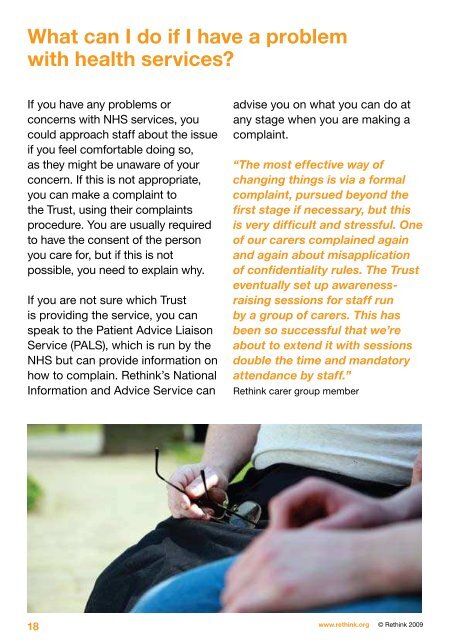You Care, You Count: A carers' guide to getting support - Rethink
You Care, You Count: A carers' guide to getting support - Rethink
You Care, You Count: A carers' guide to getting support - Rethink
You also want an ePaper? Increase the reach of your titles
YUMPU automatically turns print PDFs into web optimized ePapers that Google loves.
What can I do if I have a problem<br />
with health services<br />
If you have any problems or<br />
concerns with NHS services, you<br />
could approach staff about the issue<br />
if you feel comfortable doing so,<br />
as they might be unaware of your<br />
concern. If this is not appropriate,<br />
you can make a complaint <strong>to</strong><br />
the Trust, using their complaints<br />
procedure. <strong>You</strong> are usually required<br />
<strong>to</strong> have the consent of the person<br />
you care for, but if this is not<br />
possible, you need <strong>to</strong> explain why.<br />
If you are not sure which Trust<br />
is providing the service, you can<br />
speak <strong>to</strong> the Patient Advice Liaison<br />
Service (PALS), which is run by the<br />
NHS but can provide information on<br />
how <strong>to</strong> complain. <strong>Rethink</strong>’s National<br />
Information and Advice Service can<br />
advise you on what you can do at<br />
any stage when you are making a<br />
complaint.<br />
“The most effective way of<br />
changing things is via a formal<br />
complaint, pursued beyond the<br />
first stage if necessary, but this<br />
is very difficult and stressful. One<br />
of our carers complained again<br />
and again about misapplication<br />
of confidentiality rules. The Trust<br />
eventually set up awarenessraising<br />
sessions for staff run<br />
by a group of carers. This has<br />
been so successful that we’re<br />
about <strong>to</strong> extend it with sessions<br />
double the time and manda<strong>to</strong>ry<br />
attendance by staff.”<br />
<strong>Rethink</strong> carer group member<br />
The initial complaint is usually<br />
made <strong>to</strong> a Complaints Manager at<br />
the relevant Trust, but you can also<br />
write <strong>to</strong> the Chief Executive of the<br />
Trust or <strong>to</strong> the Chair of the Board of<br />
Direc<strong>to</strong>rs <strong>to</strong> bring their attention <strong>to</strong><br />
the issue and ask them <strong>to</strong> address<br />
it. <strong>You</strong> could ask a local councillor or<br />
your MP <strong>to</strong> do so on your behalf as<br />
this could help give the issue weight.<br />
Complaints used <strong>to</strong> go <strong>to</strong> a second<br />
stage of investigation by the Health<br />
<strong>Care</strong> Commission. However, from<br />
1st April 2009, the Health <strong>Care</strong><br />
Commission is being replaced<br />
by the <strong>Care</strong> Quality Commission<br />
(CQC), which will not be involved in<br />
investigating individual complaints.<br />
Trusts have <strong>to</strong> show that they have<br />
an effective complaints system in<br />
place before it can register with the<br />
CQC, which all health providers<br />
must do.<br />
If making a complaint is not<br />
resolved satisfac<strong>to</strong>rily by the<br />
Trust, you can write <strong>to</strong> the Health<br />
Ombudsman. It is important <strong>to</strong> note<br />
that complaints do not usually lead<br />
<strong>to</strong> financial compensation, and<br />
cannot recommend disciplinary<br />
action against health professionals.<br />
“When my son was an inpatient<br />
and I was taking him home for<br />
the weekend, he was given the<br />
wrong medication several times.<br />
My complaint about this was<br />
formally dealt with by the Chief<br />
Executive, who eventually wrote<br />
a very satisfac<strong>to</strong>ry letter detailing<br />
not only her regret, but also the<br />
steps that were being taken <strong>to</strong><br />
prevent a repetition, such as<br />
retraining for nurses, meetings<br />
with the chief pharmacist, review<br />
of ward rounds.<br />
I was so heartened by this that<br />
I ventured another, much more<br />
contentious complaint about<br />
the behaviour of the consultant<br />
psychiatrist. I chose two episodes<br />
when he made offensive<br />
comments about me at ward<br />
rounds where there were several<br />
witnesses. When the CE simply<br />
expressed her regrets, I said<br />
that, like the medication errors,<br />
there should be an account of<br />
what would be done <strong>to</strong> prevent<br />
a repeat. She then described<br />
the supervision procedure for<br />
consultants and actions in the<br />
event of a reasonable complaint<br />
– as reassuring a response as I<br />
could expect without breach of<br />
staff confidentiality.”<br />
<strong>Rethink</strong> member and carer<br />
www.rethink.org © <strong>Rethink</strong> 2009 © <strong>Rethink</strong> 2009 www.rethink.org<br />
18 19



